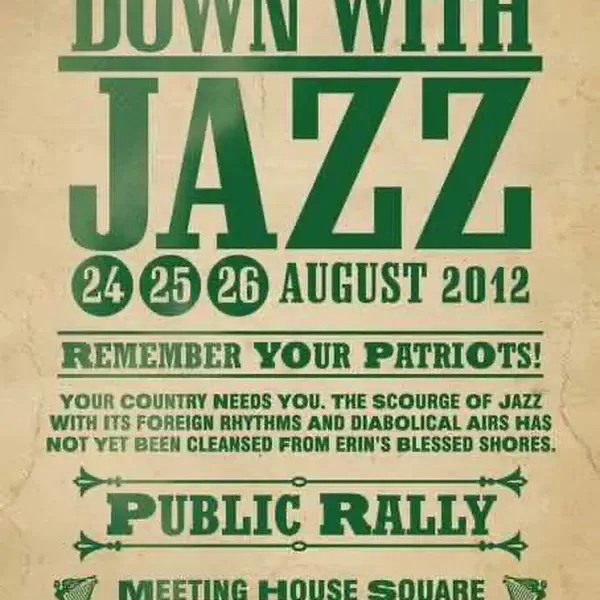
The Gaelic League Announces Expulsion for Anyone Who Attends Foreign Jazz Dances
November 06, 1929
1929 The Gaelic League bans ‘foreign dances’ and the ‘Down with Jazz’ campaign begins. We are a nation given to bans and boycotts. The latter expression, famously, has its origins in the Land War of the early 1880s.
The Gaelic League, also known as Conradh na Gaeilge, was an Irish cultural and linguistic organization founded in 1893. It aimed to promote the use of the Irish language and preserve Irish culture and traditions. In the early 20th century, during a period of cultural revival in Ireland, the organization was influential in various aspects of Irish life.
In Ireland, as in other parts of the world, there was opposition to jazz music during the early to mid-20th century, driven by various factors including conservative and moral concerns. While jazz was seen as a symbol of a more cosmopolitan and liberal culture, it was perceived by some as a threat to traditional Irish values. Here are some key points regarding the anti-jazz sentiment in Ireland:
Cultural Conservatism: Jazz was often associated with a more liberal and cosmopolitan lifestyle, which contrasted with the traditional and conservative values prevalent in Ireland during that period. Critics viewed jazz as a foreign import that could potentially have a negative influence on Irish youth.
Role of the Catholic Church: The Catholic Church had a significant influence in Ireland, and its leaders expressed concerns about the impact of jazz on Irish society. The Church’s moral authority played a role in shaping the anti-jazz sentiment in the country.
Opposition to Jazz Performances: There were attempts to regulate or ban jazz performances in certain areas of Ireland. Some cities and towns implemented restrictions on where and when jazz could be played, and some songs were considered inappropriate and faced censorship.
Decline of the Anti-Jazz Sentiment: Over time, the opposition to jazz in Ireland, as in many other places, began to wane. As cultural values evolved and as jazz itself became more accepted as an art form, the anti-jazz sentiment diminished.
Despite the initial resistance to jazz, it found a dedicated and growing audience in Ireland in the latter half of the 20th century. Jazz became an integral part of Ireland’s diverse music scene and contributed to the country’s cultural landscape.